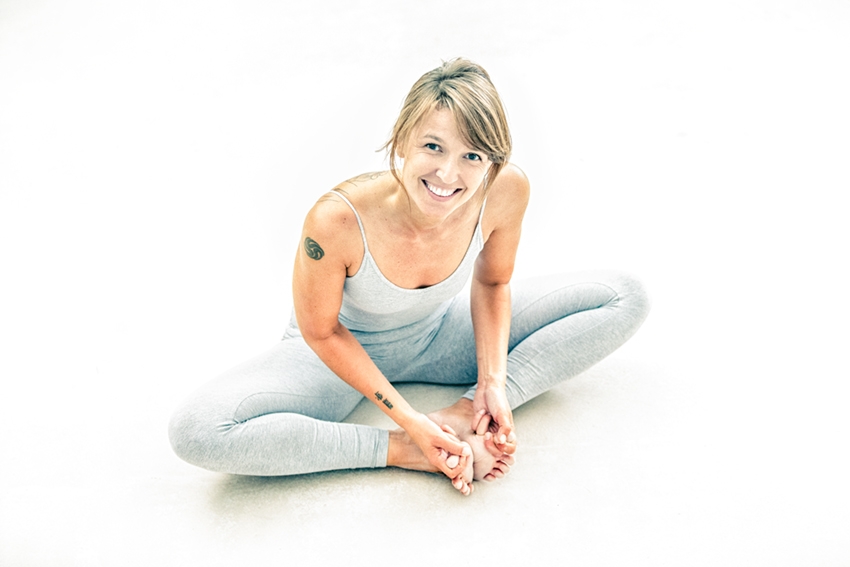“Yoga makes your body strong, supple and healthy. It helps you to stay focused and make better choices”. These are some of the main reasons people start the practice of yoga, according to Esther Ekhart. These days more and more people are busy, stressed, depressed and have (psycho-) somatic problems and so they start, or practise, yoga to support them in finding some quietness and inner peace.
While yoga teachers will come with a wide variety of knowledge and training, in a packed yoga class (or online) they will not have the time, space or maybe skills to address each students’ individual needs.
This is why yoga is, and should be, a personal practice, a tool for self-inquiry and development.
My teacher Dr. Ganesh Mohan taught me what his father said to him about yoga:
‘Be clear, get real’. Be clear about what yoga is by study and practise and make this real in your own life.
Yoga therapy – The next wave in yoga
As well as supporting our general health and wellbeing, Yoga can also be used as a specific therapeutic tool and we can see that the field of yoga therapy is growing in America and beyond. Unlike in a general class, yoga therapists work in small groups or private sessions, addressing specific health problems and adapting poses accordingly. For example for students with Multiple Sclerosis.
Modern yoga therapy can be traced back to yoga master Krishnamacharya(1888 – 1989). His teaching was based on this principle — “Teach what is appropriate for each individual.” [A.G. Mohan (2010). ’Krishnamacharya: His Life and Teachings’]
Krishnamacharya was mostly known in the West for his contribution to the revival of the more physically oriented disciplines and practices of Hatha Yoga. Therefore, he is often referred to as “the father of modern yoga”. He was the teacher of A.G. Mohan, Desikachar, Ashtanga’s Pattabhi Jois, B.K.S. Iyengar and others, and was an Indian master of yoga, teacher, an Ayurvedic physician and a scholar.
The International Association of Yoga Therapists(IAYT) define yoga therapy as being “the process of empowering individuals to progress toward improved health and well-being through the application of the philosophy and practice of Yoga”.
Dr. Ganesh Mohan (son and student of A.G. Mohan) states: “Yoga therapy is the application of Yoga to individuals to empower them to progress toward greater health and freedom from disease”.
Yoga therapists are yoga teachers with specific training in teaching yoga to individuals with health problems, to support their healing and/or recovery by guiding them into optimization of the quality of their lives. The student (or client) is still the person “doing” the yoga in a yoga therapy class or session. It’s not a passive experience like having surgery, or massage or other bodywork.
So, importantly, the yoga still remains a self-practice, the student is his or her own caregiver with guidance from a teacher.
The skills of a yoga therapist
You need a different skill set as a teacher to deliver an individual session compared to delivering an effective group class. In short, you can say that in a group class you need to be a good communicator or presenter of what a student should do, feel and experience in class. Whereas, in a one-on-one session, it’s kind of the opposite. You need the skills of a good listener to be able to hear and see the needs of the person in front of you. This way you may learn to hear the ‘question behind the question’.
The yoga therapist makes yoga accessible for people with health issues. Removing barriers to practise. Thus, a teacher needs specialist knowledge and training to discover and teach what is optimal for their student and how to help them with any particular issue.
Ask for references from your yoga therapist and get details on his/her training, credentials and experience with yoga therapy and their treatment plans for your type of injury or health issue.
The blossoming of Yoga Therapy
With the growing popularity of Yoga Therapy both in America and Europe I see that many people call their sessions or classes ‘therapy’ or ‘therapeutic’ and teachers become ‘therapists’.
But what does this mean? Yoga is therapeutic in essence, could and should we call any class therapeutic now? Is this an ethical thing to do?
And, what are the requirements or standards for a yoga teacher or health professional to call him or herself a yoga therapist?
We really need to keep talking about this as a community and with the health organisations we work with.
I talked with John Kepner (executive Director of IAYT, International Association of Yoga Therapists USA) about this recently. John said that a constructive way of building community and get together face to face is during a conference.
Yoga Therapy in The Netherlands
I practise and teach in the Netherlands and one project I am involved with is building bridges and a community of like-minded souls because I was missing a network myself. In 2010 I created The Network Yoga Therapy (NYT).
This is an initiative for professionals in yoga, the health sector and welfare. It focuses on mental health and populations with special needs (but as yoga is holistic in nature – it doesn’t exclude any field). It’s is a platform for study, practice and research. We meet for network meetings, case study and peer supervision. An important goal is to contribute to the dialogue on standards and criteria for yoga therapists as a growing profession. We held the firstInternational Conference of Yoga Therapy & Research in The Netherlands.
So, yes – Yoga makes the body strong, supple and healthy. It helps you to stay focused and make better choices it can also be a complementary intervention in modern healthcare too.
My hope for the future is that yoga becomes an evidence-based practice that will show up in the guidelines of treating mental illness. I hope that yoga teachers and therapists stay true to the yoga teachings, their own practice and keep the Yamas and Niyamas in mind so that practices result in peace of mind.
Browse Therapeutics classes on EkhartYoga
About Anneke Sips

Anneke Sips is a community psychiatric nurse (RN) and yoga teacher (E-RYT). She is the driving force behind Network Yoga Therapy. She teaches yoga and offers training and workshops herself and facilitates trainings by A.G. Mohan and his son Ganesh Mohan on authentic yoga as taught by Krishnamacharya.
www.annekesips.com | Twitter @Yoga_Amsterdam
Network Yoga Therapy – Facebook group

